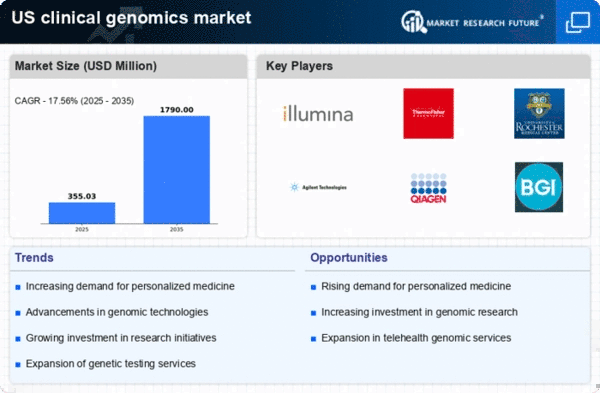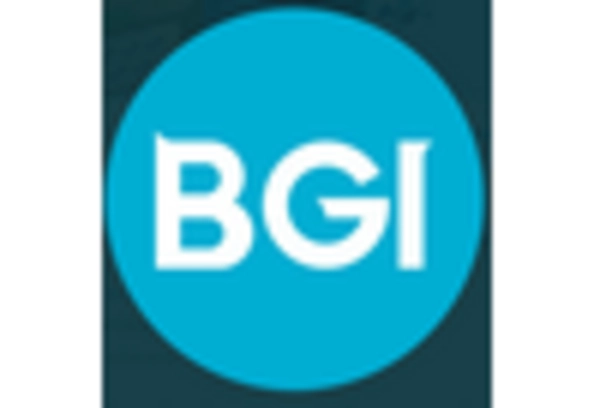Expansion of Reimbursement Policies
The clinical genomics market is positively influenced by the expansion of reimbursement policies for genetic testing and genomic services. As insurers increasingly recognize the value of genomic testing in improving patient care and reducing long-term costs, more comprehensive coverage options are being introduced. This shift is particularly evident in the US, where several major insurance providers have begun to cover a wider range of genetic tests. The increased availability of reimbursement not only alleviates the financial burden on patients but also encourages healthcare providers to incorporate genomic testing into their practice. This trend is likely to stimulate growth in the clinical genomics market as more patients gain access to essential genomic services.
Rising Demand for Precision Medicine
The clinical genomics market is experiencing a notable surge in demand for precision medicine, which tailors treatment based on individual genetic profiles. This shift is driven by an increasing recognition of the limitations of traditional one-size-fits-all approaches. In the US, the precision medicine market is projected to reach approximately $100 billion by 2026, indicating a robust growth trajectory. As healthcare providers and patients alike seek more effective treatment options, the integration of genomic data into clinical practice is becoming essential. This trend not only enhances patient outcomes but also drives the clinical genomics market forward, as more healthcare systems invest in genomic technologies to support personalized treatment plans.
Growing Public Awareness and Education
Public awareness and education regarding the benefits of genomic testing are playing a crucial role in the growth of the clinical genomics market. As individuals become more informed about the potential of genomics to influence health outcomes, there is a corresponding increase in demand for genetic testing services. Educational initiatives by healthcare organizations and advocacy groups are helping to demystify genomic technologies and their applications. This heightened awareness is likely to lead to greater acceptance of genomic testing among patients and healthcare providers alike. Consequently, the clinical genomics market is expected to expand as more individuals seek out genomic insights to inform their healthcare decisions.
Increased Focus on Preventive Healthcare
The clinical genomics market is benefiting from a growing emphasis on preventive healthcare strategies. As healthcare systems in the US shift towards proactive measures, genomic testing is increasingly viewed as a vital tool for identifying individuals at risk for various diseases. This proactive approach not only aims to improve patient outcomes but also seeks to reduce healthcare costs associated with late-stage disease management. The market for preventive genomics is expected to grow significantly, with estimates indicating a compound annual growth rate (CAGR) of over 15% in the coming years. This trend underscores the importance of integrating genomic insights into preventive healthcare initiatives, thereby driving the clinical genomics market.
Technological Advancements in Genomic Sequencing
Technological advancements in genomic sequencing are significantly impacting the clinical genomics market. Innovations such as next-generation sequencing (NGS) have drastically reduced the cost and time required for genomic analysis. The price of sequencing a human genome has plummeted from around $100 million in 2001 to less than $1,000 today. This dramatic decrease has made genomic testing more accessible to healthcare providers and patients, thereby expanding the market. Furthermore, the development of user-friendly platforms for genomic data interpretation is facilitating the integration of genomic information into routine clinical practice, which is likely to enhance the overall efficiency and effectiveness of healthcare delivery.

















Leave a Comment